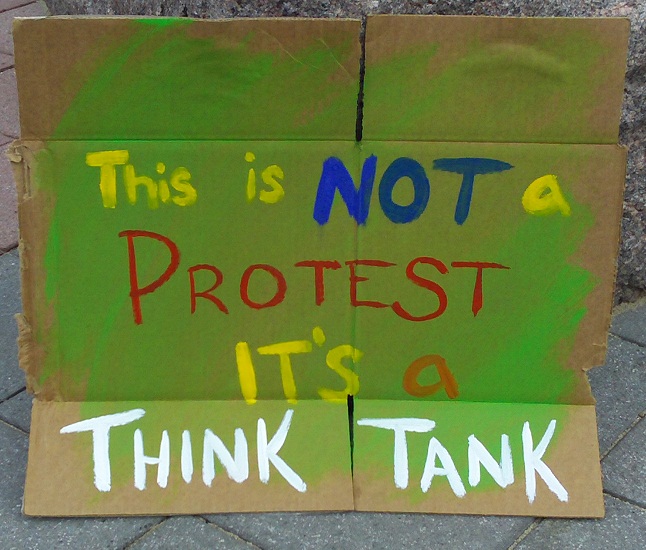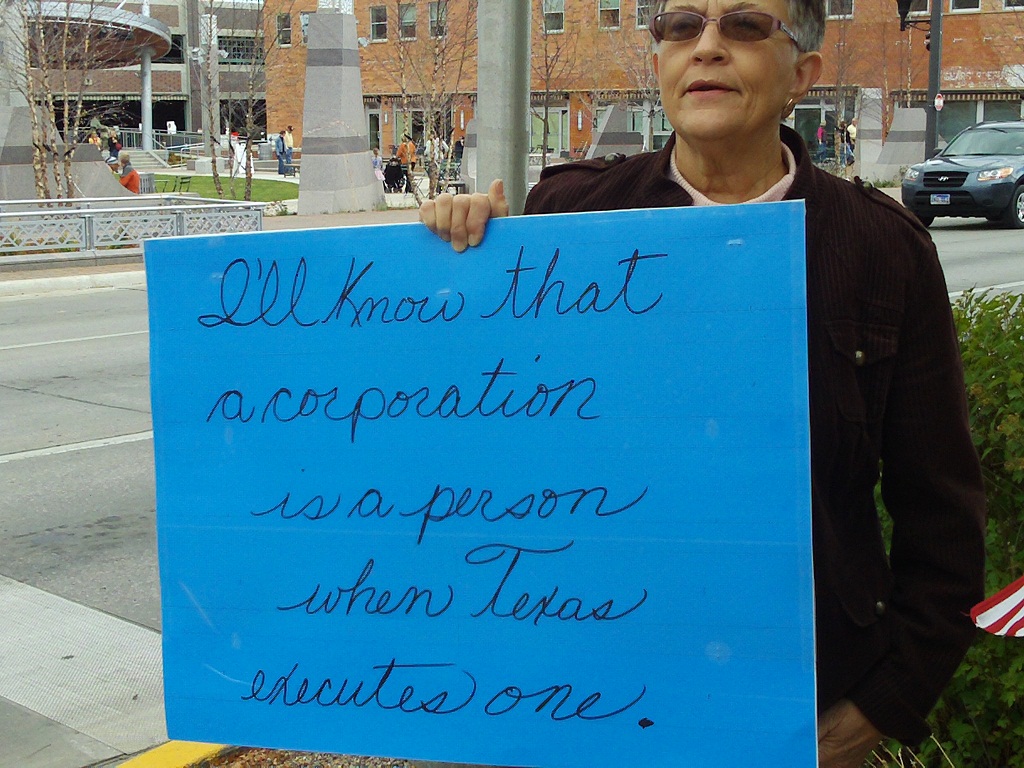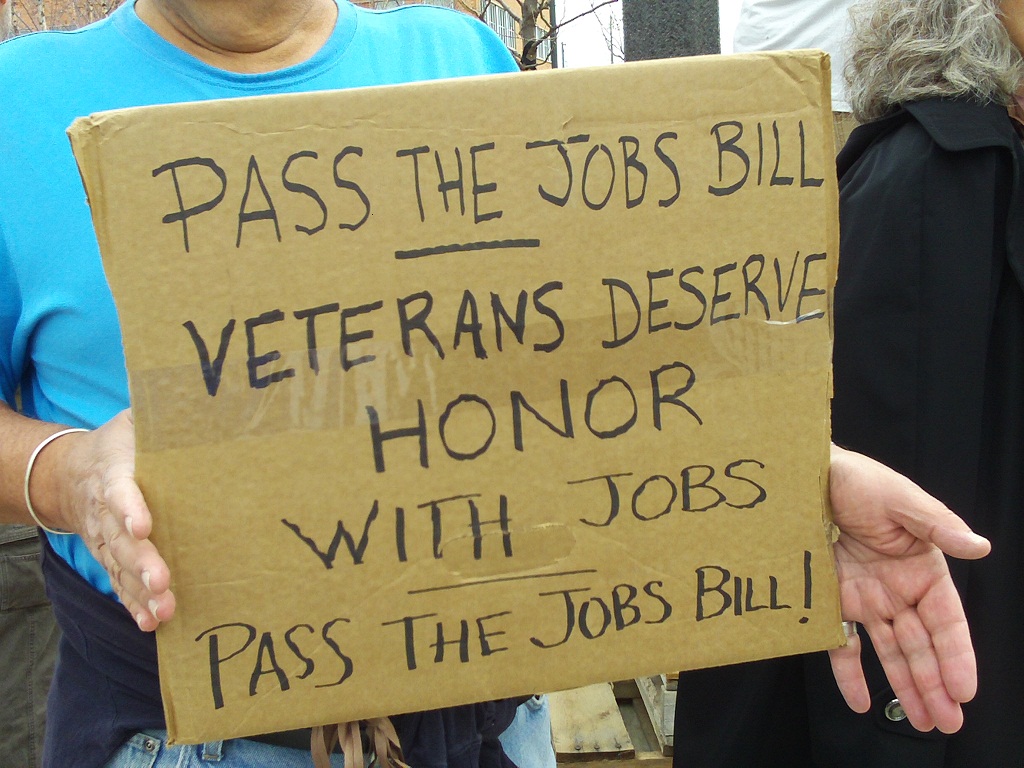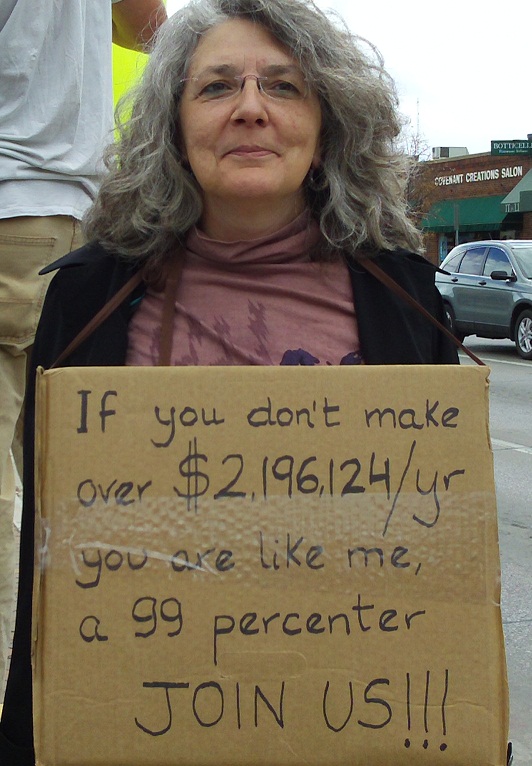
My daughter and I went to Rapid City to engage the capitalist beast with our dollars. Several of our neighbors were at 6th and Main engaging the beast with their First Amendment Rights.

Let's hear from five of our neighbors who were on the corner adding their voices to the nationwide Occupy Wall Street protest.
Marvin Kammerer sure doesn't look like some lazy hippie. He sees fascism afoot in the Pharisaic patriotism and piety of the defenders of crony capitalism:
This gentleman sees big money corrupting our politics.
Claudia Perry thinks we all need to speak up for our rights:
Kim Allery says we've been robbed!
Tom Katus puts our problems in local terms, drawing a connection between the national concerns raised by the Occupiers and real South Dakota worries about unfair legislative redistricting, big-money politics, and one-party rule:
Protesters shared numerous other messages with passersby:




Cory, I sympathize with these protesters in some ways, but not in all ways.
Some investors and corporate CEOs have rigged the system so that a small minority profits from the misfortunes of the vast majority. Certainly this injustice must end.
But that sign, "I'll know that a corporation is a person when Texas executes one," along with lots of generalized rhetoric and hyperbole, overlooks something, I think.
If all the corporations go away, who will provide the jobs for most people? Do you want us all to become government employees or wards of the state? Really?
Now if you all were out with signs that said, "Kucinich for President" or "Sanders for President," I'd have a little more confidence that you all are focused on something concrete.
Think tanks are great, but they don't pull the apple cart.
...a little perspective for Stan.
http://www.nytimes.com/2011/10/23/opinion/sunday/friedman-one-country-two-revolutions.html?_r=2
Key grafs relevant to your point here, Stan:
"Over the last decade, America’s banking sector got pumped up by steroids — in the form of cheap credit and leverage — every bit as much as Major League Baseball’s home run hitters. And if one result of the downsizing of Wall Street is that more of America’s best and brightest math and physics students decide to go into science and real engineering rather than financial engineering, the country will be a whole lot better off.
Why? Because, to paraphrase the Columbia University economist Jagdish Bhagwati, Wall Street, which was originally designed to finance “creative destruction†(the creation of new industries and products to replace old ones), fell into the habit in the last decade of financing too much “destructive creation†(inventing leveraged financial products with no more societal value than betting on whether Lindy’s sold more cheesecake than strudel). When those products blew up, they almost took the whole economy with them."
I agree, Stan, in my eagerness to see this movement evolve into concrete political action. But as I was reminded yesterday, step one in a movement to change the culture is to get people talking about the culture. That culture has developed over decades. It has gobs of laws, court rulings, and big money behind it. Changing it will take some time. And hey: the Tea "Party" had a year and a half to find candidates and exert its influence on the mid-term elections. The Occupiers have been at it for a couple months.
On the vilification of corporations: I don't think the woman with the sign on corporate personhood would advocate the complete dismantling of every corporation. I think she would agree that granting corporations legal personhood allows them to have too much influence in politics (cf. Citizens United). Can we abolish corporate personhood without abolishing corporations and jobs?
"destructive creation" vs. "creative destruction" -- fascinating, Bill!
Why agree with Stan? I've never heard anyone say they wanted corporations to go away, except in his comment. These gathering may attract some extremists, but both the 2nd and 4th clip simply say get big money out of politics. They hit it right on the head with Citizens United and the disparity between the 1% and everybody else. Stan may be right about one thing. I secretly want to be a ward of the state.
Hey Stan- here's a definition you may find helpful
http://en.wikipedia.org/wiki/Straw_man
Stan, we just want to help Wall Street withdraw from its addiction to gambling with our money. They are tearing the "family" apart. Many if not most of them should either be in prison or in treatment. Which would you prefer?
In any case, these addicts shouldn't be able to use their illegally gained wealth to push their habit on our politicians and the American public by funding election campaigns. That will just perpetuate the problem. We need to move toward sanity, rehabilitation and recovery.
I recommend watching the new HBO movie "Too Big To Fail" for further insights on my comments above.
Obviously there isn't a refined message because there is no structure to create one. A story in the Atlantic shows an ad guy trying to sum up in five points what he's getting from people in NY:
"I want the war to stop and the money to go to education and health care."
"I want accountability."
"I want a constitutional amendment banning all private money from government."
"I want gay people to have equal rights."
"I want a more honest dialogue in this country."
Stan, he forgot to include complete takeover by the Communists and description of lock up facilities, since we're all gonna be wards in the new world order.
http://www.theatlantic.com/business/archive/2011/10/occupy-wall-streets-marketing-crisis-what-would-an-ows-brand-look-like/247175/
That sign also says something about the death penalty. I assume that the "occupiers" oppose it, as do I. That's just another thing that makes me an atypical Republican.
From the Atlantic article: "Occupy Wall Street is a Monet protest: The closer you look at it, the less sense it makes."
Obviously, the writer doesn't understand EITHER the protest or Monet paintings. The closer you get to a Monet painting, the more you understand EXACTLY what it is*. Really really pedestrian writing. I'm surprised the Atlantic printed it.
.................................
* A Monet painting is exquisitely, masterfully applied paint. Complex emotion — in response to an environment — captured in form. A protest movement is people... each one a brush stroke... well, you get the picture, right?
It's still murky though not in our own minds perhaps. Andrew Sullivan has a good handle on what's driving it (Not left or right, but balance): http://www.thedailybeast.com/newsweek/2011/10/23/how-i-learned-to-love-the-goddamned-hippies.html
Yes, John, both impressionism and physical reality are murky. Both exist at the a crossroads where chaos and order collide, the human hearts involved in the process seek clarity, truth, meaning and cohesion. It is our existential condition. As far as we know there is no other.
People just don't like gray, that insecurity so we try to categorize, and usually with what's in place, but right now our problems just cannot be solved by what we have.
Cannot? Or will-not?
I think we probably have the means, John. Perhaps just not the proper motivation. Hence, people in the streets.
A good manager doesn't do his staff's work for them, he expects them to do it, that's why he hired them.
Right now, the real bosses are in the streets telling the people they hired (politicians and money mangers) to do their jobs right, or else.
It's up to Washington and Wall Street to figure out how.
That's what "We the People" have hired them to do.
Bill--I'm not at all surprised that the Atlantic printed that nonsense. They also pay for the self-absorbed blatherings of glibertarian "economist" Megan McArdle.
I picked up a copy of BAD MONEY today..down to $5.97. Anyway, Kevin Phillips indicates "merchantilism" has been driving government through several administrations. A couple of the quotations he uses are Gresham's Bad money driving out good money, and another writer saying that "Bad capitalism drives out good capitalism". I haven't read much of it yet, but in 2008, it gave a pretty good indication why we the 99% are considered irrelevant by the big money and those mostly interested in making money by moving it instead of actually making anything. Phillips mentions the Bush family money heritage. Clinton's New York Wall St connections, etc. A link to a review is below.
http://www.latimes.com/entertainment/la-et-rutten16apr16,0,4634814.story